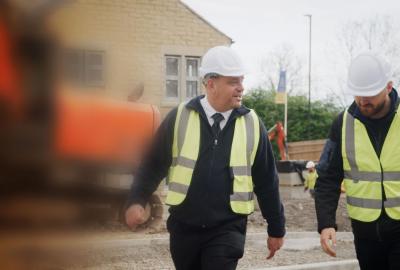It’s no secret that your body language can give away how you really feel. Whether you’re trying to show someone you are interested in them romantically or are feeling angry, this all comes across through the way you act which is why you have to aware of your body language in certain situations, especially interviews.
Everybody has physical habits whether it’s playing with hair, foot tapping or being a fidget. It could even be postural things like slouching, but this all comes across during a job interview and may distract away from your abilities to do the job or your personality.
Interview settings are generally high pressure so the stakes are high. This is why it is important to know what your body is doing and how it is being perceived on the other side of the desk.
Posture during an interview.
Experts across the world all say that a good posture can do wonders for your confidence and the way you carry yourself. Leaning back typically suggests boredom or a lack of interest whereas leaning forward shows that you are intently listening in and paying attention. People also lean closer to individuals they like and so leaning back could signal the opposite. At the same time leaning too far forward or too intimately could be construed as intimidating.
Your interviewer might not take too kindly to you crowding their desk and invading their personal space. The best way to conduct an interview is by sitting up straight and being attentive. Imaging there is a string attached to the top of your head and the ceiling. Standing up straight gives the impression of self-assurance and also makes you appear taller which is often seen as a sign of intelligence, confidence and credibility.
Gestures.
There’s a variety of little habits people pick up over the years and might not even notice. For example, some people often point when they are talking which is seen as an aggressive motion and, in some cultures, incredibly offensive.
Chopping motions are also a bad move because it can psychologically cut up the space between you and your interviewer in an aggressive way.
It would be well worth paying attention to what your hands are doing in an interview. For example, if you shove your hands in your pockets, behind your back or even have them crossed in front of your chest it could give you a closed and harsh demeanour rather than an open and approachable one.
A lot of people talk with their hands and use them to animate what they are saying. It is innate human behaviour as studies show that even those without the use of their sight use hand gestures whilst they talk.
However, be cautious that you’re not waving your hands around too vigorously during your interview as this may be distracting. Instead, talk slowly and naturally, allowing your hand gestures to reinforce what you’re saying rather than dominating the conversation.
Grooming and how to present yourself in an interview.
Playing with your hair, fingernails or jewellery is part of a nervous desire to look your best. It’s very common, especially in high-pressure situations, but the last thing you want to do is distract the interviewer or come across as nervous.
These nervous habits which can be so intrinsic and unavoidable, are actually quite easy to kick. You can avoid doing them, at least for the short window of your interview, by not wearing rings, watches and jewellery or keeping your hair in a tight style that reduces the opportunity for adjusting it. This also lets the interviewer see your face clearly and engage with you whilst displaying a professional image.
For real questions asked at interview then please visit actual interview questions - what will they ask?

